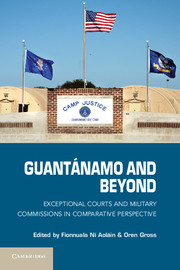Book contents
- Frontmatter
- Contents
- Contributors
- Acknowledgments
- Introduction: Guantánamo and Beyond
- Part I Military Commissions and Exceptional Courts in the United States
- 1 The Development of an Exceptional Court
- 2 Military Commissions in Historical Perspective
- 3 Contemporary Law of War and Military Commissions
- 4 Military Commissions and the Paradigm of Prevention
- 5 Prevention, Detention, and Extraordinariness
- 6 In Defense of Federal Criminal Courts for Terrorism Cases in the United States
- 7 Exceptional Courts and the Structure of American Military Justice
- 8 Exceptional Courts in Counterterrorism
- Part II Exceptional Courts and Military Commissions Elsewhere
- Part III International Law, Exceptional Courts, and Military Commissions
- Index
- References
7 - Exceptional Courts and the Structure of American Military Justice
Published online by Cambridge University Press: 05 June 2014
- Frontmatter
- Contents
- Contributors
- Acknowledgments
- Introduction: Guantánamo and Beyond
- Part I Military Commissions and Exceptional Courts in the United States
- 1 The Development of an Exceptional Court
- 2 Military Commissions in Historical Perspective
- 3 Contemporary Law of War and Military Commissions
- 4 Military Commissions and the Paradigm of Prevention
- 5 Prevention, Detention, and Extraordinariness
- 6 In Defense of Federal Criminal Courts for Terrorism Cases in the United States
- 7 Exceptional Courts and the Structure of American Military Justice
- 8 Exceptional Courts in Counterterrorism
- Part II Exceptional Courts and Military Commissions Elsewhere
- Part III International Law, Exceptional Courts, and Military Commissions
- Index
- References
Summary
MOST DISCUSSIONS OF “EXCEPTIONAL” COURTS TEND TO focus on the specific nature of adjudication before such tribunals. Whether directed to the jurisdiction of these ersatz bodies or the procedural, evidentiary, or substantive rules by which they operate, analyses of such institutions necessarily presuppose that the relevant comparison is horizontal, that is, that the question to ask is how the rules differ as between the extraordinary and the ordinary. Once one understands the full extent of the differences, one can better assess whether these variances, to the extent that they are permissible in the abstract, can be squared with the proffered justifications for departing from the norm.
In the U.S. context, virtually all of the debate over the military commissions at Guantánamo Bay has focused on myriad respects in which proceedings before those tribunals differ from the preexisting baseline, be it criminal trials in the Article III federal civilian courts or courts-martial in the Article I system created by Congress. Those who defend the commission process tend to emphasize how it can accommodate the government's interests in ways that the civilian courts and courts-martial cannot; those who attack it typically assert that such accommodations are either unnecessary, unconstitutional, or both. The same goes for arguments for and against proposals for hybrid “national security courts” that mesh elements of each system.
- Type
- Chapter
- Information
- Guantánamo and BeyondExceptional Courts and Military Commissions in Comparative Perspective, pp. 163 - 180Publisher: Cambridge University PressPrint publication year: 2013
References
- 1
- Cited by



